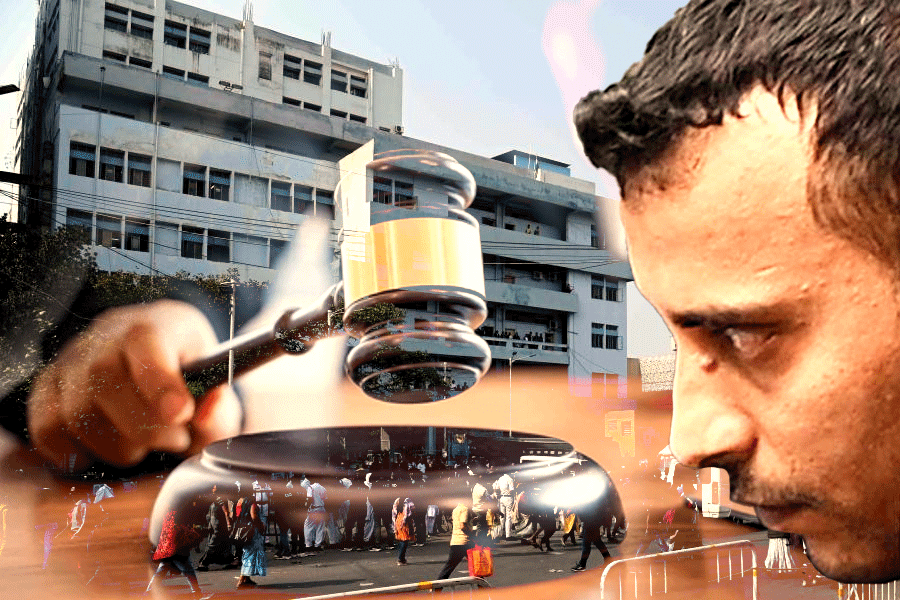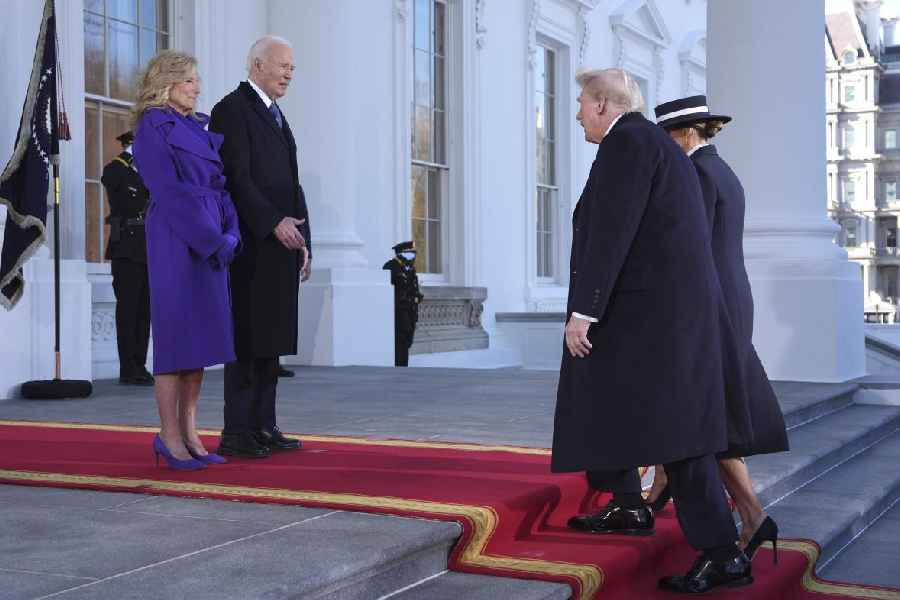A little after 2.45pm on Monday, Judge Anirban Das of the CBI special court at Sealdah awarded life imprisonment to Sanjay Roy, the former Kolkata Police civic volunteer found guilty on Saturday in the rape and murder of the 31-year-old postgraduate trainee at the RG Kar Medical College and Hospital on August 9.
As justification for not giving the death penalty to the convict, the judge said the crime did not fall under the “rarest of the rare” category.
Judge Das pronounced the sentence at court room number 210.
The same court had pronounced Roy guilty under Bharatiya Nyay Sanhita’s sections 64 (punishment for rape), 66 (punishment for causing death) and 103 (punishment for murder). The judge said the evidence produced by the Central Bureau of Investigation (CBI) which started the probe on the orders of the Calcutta high court was compelling enough and pronounced him guilty.
On Saturday before giving his verdict, replying to Judge Das, Roy had said he had been framed. On Monday when he was produced before the court around 12.36pm, Roy maintained his innocence.
The CBI lawyer pleaded for the highest penalty for the convict, calling the crime "rarest of the rare".
"We pray for the highest penalty to maintain people's faith in the judiciary," the agency's counsel told the court.
The defence lawyer of Roy argued that the prosecution must provide evidence that can prove that there is no possibility of reform of the convict. The defence counsel prayed for “an alternative punishment other than the death penalty” to allow his reformation.
The lawyer representing the parents of the deceased doctor prayed for the maximum punishment, arguing that Roy, being a civic volunteer, was entrusted with the security of the hospital, but had himself committed the heinous crime on the victim he was supposed to protect.
The hearing of the convict's self-defence and other stakeholders concluded around 1pm.
The defence pleaded with the court to consider other punishments instead of the death sentence, and referred to the Supreme Court’s directive on the death penalty.
Judge Das asked Roy’s counsel Sourav Bandyopadhyay and Kabita Sarkar to submit the SC directives in writing.
While the judge was dictating the order, outside the Sealdah Metro stations, sections of the medical community and social organisations claimed others involved in the rape and murder as well as the cover-up were being shielded.
“Roy’s involvement was never in doubt. But he could not be the only person to have carried out this gruesome crime. Those involved remain free and have not even been named yet. After today they will be convinced of their invincibility if they are not named and punished and remain a threat to the society,” said a protester.
Members of a platform of civil rights activists and common citizens of Calcutta as well as the junior doctors’ platform, the joint platform of doctors’, organisations of nurses working in state-run hospitals held the demonstration ignoring the Kolkata Police’s order against any assembly in the court premises.
The Sealdah court was out of bounds for protesters who assembled outside the metro station and raised slogans against the court and the central investigation agency, calling for justice in the case.
“Had this unfortunate incident not happened, the dark side of the state health department would not have been exposed. Corruption, nepotism is rampant in the health department. Why she had to die has not been established yet,” said Shubhankar Sarkar, state Congress president, who led another protest with party supporters near the court premises.
Found guilty of sexually assaulting the doctor and throttling her to death, Roy was convicted by the judge under Sections 64, 66 and 103(1) of the Bharatiya Nyaya Sanhita (BNS).
Section 64 (rape) of the BNS entails a punishment of not less than 10 years and can go up to life term.
Section 66 (punishment for causing death or resulting in persistent vegetative state of victim) provides for punishment of not less than 20 years that may extend to imprisonment for life, which shall mean imprisonment for the remainder of that person's natural life, or with death.
Section 103(1) (murder) of BNS provides for the death penalty or imprisonment for life to a person convicted of the crime.
Flanked by multiple police vehicles, Roy was brought out of jail around 10.15am. He was brought to the Sealdah court premises in Kolkata at 10.40am.
The Sealdah court was fortified with nearly 500 policemen deployed and the authorities left no stone unturned to prevent any untoward incident, an officer said.
Despite the heavy police deployment, many people thronged the court premises and some were seen attempting to climb railings to catch a glimpse of the convict.
On their way to the court, the parents of the deceased doctor said they trusted the judiciary to deliver justice.
“We have faith in the judge,” said the victim’s father. “We want Sanjay Roy to be given the death penalty and also want that others involved in the crime are brought to book”
The deceased doctor's mother expressed disappointment with the CBI investigation, alleging that "other perpetrators involved in the crime had not been brought to justice".
“Only one person is not involved in the crime, yet the CBI has failed to apprehend the others. Such criminals have no right to live if we are to prevent future crimes in society,” the bereaved mother said.
Kolkata Police denied permission to junior doctors' bodies to hold a demonstration in the Sealdah court area.
Sanjay Roy's mother did not respond to the media, but his sister said: "All evidence is against him. If he receives severe punishment, even the death penalty, what can we do?"













